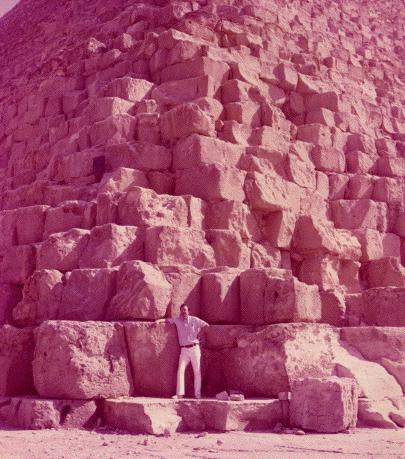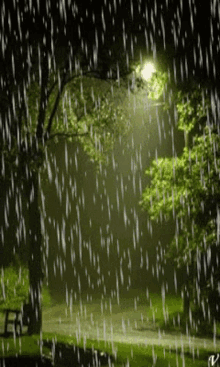
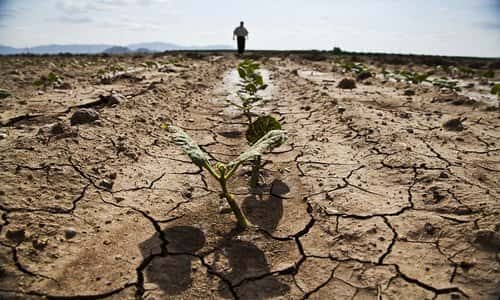
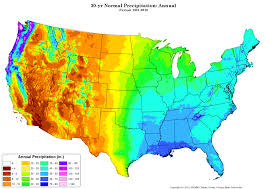
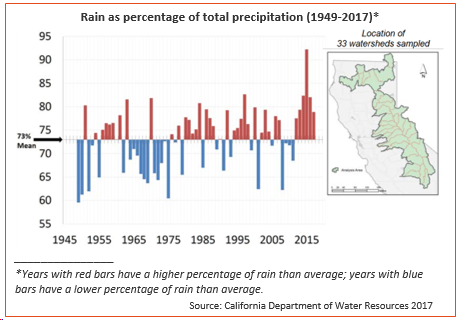
We all knew that this day was coming eventually. At first dropping water levels in the Southwest were an annoyance, then they became a problem, and now they have become a crisis. In fact, as you will see below, we are now potentially facing the worst water crisis in all of U.S. history if current trends continue.
For years, I have been warning that Dust Bowl conditions would return to the western half of the country, and now it has happened. And for years, I have been warning of a looming water crisis, and now it is materializing right in front of our eyes. Unfortunately, what we have experienced so far is just the tip of the iceberg because this crisis is still only in the very early chapters.
In California's San Joaquin Valley, the lack of water has become really severe and it seems to get worse with each passing month.
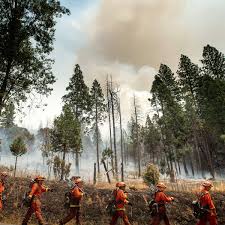 At this point, we are being told that thousands of households in the region have wells that have completely gone dry...
At this point, we are being told that thousands of households in the region have wells that have completely gone dry...
The Sevillas are just one of thousands households across the San Joaquin Valley whose wells have gone dry amid increasingly hot temperatures and drought. Every year, a new town in this verdant agricultural region seems to be pushed over the brink by water scarcity -- like East Porterville, an unincorporated community in Tulare County, in 2014, and, most recently, Teviston, a census-designated place in the same county.
Of course anyone that has lost water could always choose to dig another well, but that can be exceedingly expensive, and even those that are able to pay often find themselves on the bottom of very long waiting lists...Even those who can afford to pay upfront for new wells must join waiting lists as drilling companies await the back-ordered equipment they need to build and install them. Local officials provide jugs and gallons of water, and local organizations offer aid if resources aren't already tapped out. Needless to say, it isn't just those that are on wells that are in trouble. Supplies of water are extremely tight throughout the state, and we just learned that a "supply alert" has now been issued for southern California...
Southern California's powerful water agency on Tuesday issued a supply alert, calling on the region to conserve vital resources and prepare for continued drought -- a move that brings the state's largest population center closer to the tough water restrictions imposed on communities elsewhere. Elsewhere, the crisis has become even more serious. Water levels in the once mighty Colorado River just keep dropping, and this is an enormous problem because so many major cities in the Southwest are deeply dependent on it...Today, this river system supplies 40 million people in seven western states and Mexico, and irrigates more than 5 million acres of farmland on its way into Mexico and the Gulf of California.
Las Vegas relies on the river for 90% of its water supply, Tucson for 82% and San Diego for around 66%. Large portions of the water used in Los Angeles, Phoenix and Denver also come from the river, and experts say these booming metropolises would not have been possible without its supply. Without the Colorado River, the entire region would look completely different. There are two giant reservoirs that are particularly important. Unfortunately, water levels in both Lake Mead and Lake Powell have dropped to historically low levels...Lake Mead -- the largest man made reservoir in the US, which is fed by the Colorado River -- recently sunk to its lowest levels since the lake was filled in the 1930s. Its water levels have fallen more than 146 feet since their peak in January of 2000, and the lake is now just 35% full. Lake Powell, the river's second largest reservoir, sits at 32% of its capacity. As water levels drop, billions of kilowatt hours of hydroelectricity that power homes from Nebraska to Arizona are also at risk. If water levels in Lake Mead and Lake Powell keep dropping, we are going to see things happen that would have once been unimaginable.
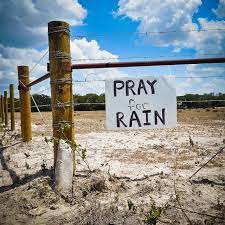 And the truth is that we are rapidly approaching a danger point. Last week, federal officials officially declared a "Tier I shortage emergency" along the Colorado River for the first time ever, and that will force some automatic water restrictions to soon kick in...U.S. officials on Monday declared the first water shortage from a river that serves 40 million people in the West, triggering cuts to some Arizona farmers next year amid a gripping drought. Water levels at the largest reservoir on the Colorado River -- Lake Mead -- have fallen to record lows. Along its perimeter, a white "bathtub ring" of minerals outlines where the high water line once stood, underscoring the acute water challenges for a region facing a growing population and a drought that is being worsened by hotter, drier weather for longer periods of time. Already, farmers all over the western third of the nation have been dealing with very harsh water restrictions, and agricultural production has been affected.
And the truth is that we are rapidly approaching a danger point. Last week, federal officials officially declared a "Tier I shortage emergency" along the Colorado River for the first time ever, and that will force some automatic water restrictions to soon kick in...U.S. officials on Monday declared the first water shortage from a river that serves 40 million people in the West, triggering cuts to some Arizona farmers next year amid a gripping drought. Water levels at the largest reservoir on the Colorado River -- Lake Mead -- have fallen to record lows. Along its perimeter, a white "bathtub ring" of minerals outlines where the high water line once stood, underscoring the acute water challenges for a region facing a growing population and a drought that is being worsened by hotter, drier weather for longer periods of time. Already, farmers all over the western third of the nation have been dealing with very harsh water restrictions, and agricultural production has been affected.
California alone produces approximately a third of our vegetables and about two-thirds of our fruits and nuts. Many farmers in the state aren't growing anything at all this year due to the lack of water, and the outlook for next year is not promising either. Not even during the Dust Bowl days of the 1930s did we have to deal with a water crisis of this magnitude. If this multi-year mega-drought stretches on, communities in the Southwest are going to be facing some heartbreaking choices. The 20th century was a time when the western third of the nation was blessed with an unusually high level of rain, and during that time we built gleaming new cities in areas that were once desert.
Now a historic drought is here, and there simply isn't enough water to go around. And all of this is happening at a time when so many other major problems are erupting in our society. I wish that I could tell you that the drought will end and that everything will turn around soon. But I can't. The truth is that this is a very serious long-term crisis that has been growing for years, and there aren't going to be any easy answers. --Prophecy News Watch.
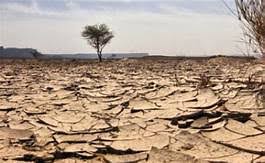
“Behold, the days are coming,” says the Lord God,
“That I will send a famine on the land,
Not a famine of bread,
Nor a thirst for water,
But of hearing the words of the Lord.
They shall wander from sea to sea,
And from north to east;
They shall run to and fro, seeking the word of the Lord,
But shall not find it.
“In that day the fair virgins
And strong young men
Shall faint from thirst.
Those who swear by the sin of Samaria,
Who say,
‘As your god lives, O Dan!’
And, ‘As the way of Beersheba lives!’
They shall fall and never rise again.” (Amos 8:9-14)
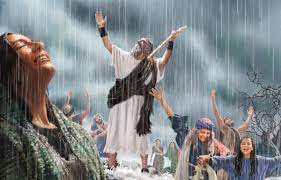 Very important history for us in California! Our rainfall is way lower than it used to be. Our summer wild fires (and smoke) are worse each year. PG&E is in a state of bankruptcy. Some believe the wild fires are not natural. No one is praying about this apparently?
Very important history for us in California! Our rainfall is way lower than it used to be. Our summer wild fires (and smoke) are worse each year. PG&E is in a state of bankruptcy. Some believe the wild fires are not natural. No one is praying about this apparently?
Where is Elijah when we need him?
Elijah was a man with a nature (homoiopathes = passions) like ours, and he prayed earnestly that it would not rain; and it did not rain on the land for three years and six months.
And he prayed again, and the heaven gave rain, and the earth produced its fruit.” (James 5:17-18)
EARLY POLITICAL CORRUPTION IN CALIFORNIA!!
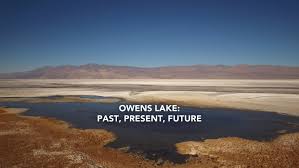
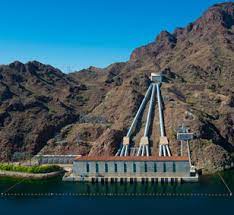 Some water wells are now badly polluted because of huge unseen plumes of poisoned ground, requiring expensive remediation. Many other wells are dry or have reached the salt water table. Aqueducts such as our Hetch Hetchy (c1923) push fresh melted snow from our magnificent Sierra Nevadas to quench the thirsty hordes in San Francisco and on the equally Pagan Peninsula.
Some water wells are now badly polluted because of huge unseen plumes of poisoned ground, requiring expensive remediation. Many other wells are dry or have reached the salt water table. Aqueducts such as our Hetch Hetchy (c1923) push fresh melted snow from our magnificent Sierra Nevadas to quench the thirsty hordes in San Francisco and on the equally Pagan Peninsula.
Few realize that California’s climate is “Mediterranean Dry” —much like Israel’s. Winter and Spring rains, with hot summers. Not many wells or springs. Rainfall amounts decrease from Eureka in the North to San Diego in the South. We have floods in wet years, drought in dry years. A huge study in “Cadillac Desert” by Marc Reisner in 1986 shook me to the core, though I did nothing about his warnings. The book is about the theft of Northern California water (in the 1920s) now carried by great aqueducts to Los Angeles.
The book Cadillac Desert (1986) by Marc Reisner is excellent!
Subject: How Los Angeles Gets Its Water: A Complete History of The Los Angeles Aqueduct
L.A. Times: U.S. West prepares for a worst-ever water shortage declaration (April 20, 2021)

Recently California’s governor allocated $15 billion for “Climate Control.” Praying for rain is the only live option! $15b won’t do any good!
Psalm 135 came to mind:
I also remembered old King Nebuchadnezzar whom God humbled powerful after Daniel helped this autocrat see who is running the universe.
Jesus spoke of ten wise and ten foolish virginas, all religious. But Ten were left behind when it was time for the royal wedding of the king's son. God is a Person and "And before him no creature is hidden, but all are naked and laid bare to the eyes of the one to whom we must render an account. " (Hebrews 4:13) Pride is a deadly thing and to be taken seriously because "God resists the poud but gives grace to the humble. Therefore humble yourselves under the mighty hand of God, that He may exalt you in due time,." (1 Peter 5:5,6)
We are houseguests in God's universe and God can (and does) evict, depose, and eliminate those who refuse His rule in their lives. Jesus our Lord is very patient thankully!

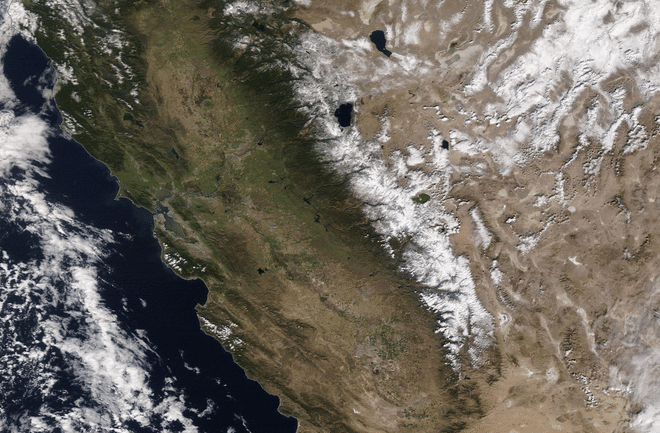
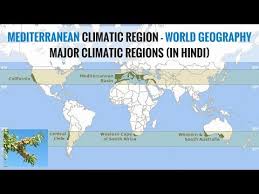 California's climate resembles that of Israel. We have hot dry summers and cool rainy winters. A high pressure cell in the Pacific Ocean normally lies off the coast. Storms generated in the Gulf of Alaska to the North are blocked from coming South to California and shunted across to the East into Canada--unless the blocking high pressure fails and the gate is opened. Lately the gate has been closed year after year except for a few brief windows. The other factor in California's rain is the "Pineapple Express." Occasionally sub tropical storms generated in the vicinity of Hawaii are able to move North bring rain the Southern California and to the North. For many years California has experiencing drought, and the entire Western States have likewise. The entire Western U.S. gets its rain from the West. The Sierra Nevada mountain range, the state's backbone, and the Rocky Mountains further East, uplift moist air flowing from the East generating snow packs containing water needed in the summer. Israel, by the way, has had abundant rain in the last few years and this is no accident of nature.
California's climate resembles that of Israel. We have hot dry summers and cool rainy winters. A high pressure cell in the Pacific Ocean normally lies off the coast. Storms generated in the Gulf of Alaska to the North are blocked from coming South to California and shunted across to the East into Canada--unless the blocking high pressure fails and the gate is opened. Lately the gate has been closed year after year except for a few brief windows. The other factor in California's rain is the "Pineapple Express." Occasionally sub tropical storms generated in the vicinity of Hawaii are able to move North bring rain the Southern California and to the North. For many years California has experiencing drought, and the entire Western States have likewise. The entire Western U.S. gets its rain from the West. The Sierra Nevada mountain range, the state's backbone, and the Rocky Mountains further East, uplift moist air flowing from the East generating snow packs containing water needed in the summer. Israel, by the way, has had abundant rain in the last few years and this is no accident of nature.
The ocean water along the coast of California is cold for a couple of reasons. First, the California Current brings cold water from Alaska southward along the coast. And second, cold water from the deep ocean comes up to the surface through a process called upwelling. From March through September, wind blows southward along the coast. This wind, combined with the rotation of the earth, creates surface currents that move water from the coast out into the ocean. Something has to fill in the space that was left behind when the surface waters moved out to sea. So water from the deep ocean is sucked to the surface.
Weather prediction in the United States has been part of our national life and legacy since 1850. This has not been a modest venture but conducted on a grand scale taking advantage of the latest scientific models of weather and climate.
On February 2, 1870, the United States Congress passed a resolution requiring the Secretary of War “to provide for taking meteorological observations at the military stations in the interior of the continent and at other points in the States and Territories...and for giving notice on the northern (Great) lakes and on the seacoast by magnetic telegraph and marine signals, of the approach and force of storms.” The Resolution was signed into law on February 9, 1870 by President Ulysses S. Grant, and the precursor to the Weather Bureau and National Weather Service was born.
The new agency, called the Division of Telegrams and Reports for the Benefit of Commerce, was formed under the U.S. Army Signal Service. The new weather agency was placed under the War Department because “military discipline would probably secure the greatest promptness, regularity, and accuracy in the required observations.” Because of the long name, the agency frequently referred to it as the national weather service or general weather service of the United States.
Signal Service: The new weather agency operated under the Signal Service from 1870 to 1891. During that time, the main office was located in Washington, D.C., with field offices concentrated mainly east of the Rockies. Most forecasts originated in the main office in Washington with observations provided by field offices.
During the Signal Service years, little meteorological science was used to make weather forecasts. Instead, weather which occurred at one location was assumed to move into the next area downstream. The weather forecasts were simple and general in content -- usually containing basic weather parameters such as cloud and precipitation.
The Division of Telegrams and Reports for the Benefit of Commerce remained under the Signal Service until 1891. On October 1, 1890, Congress voted to transfer it to the Department of Agriculture and renamed the Weather Bureau. The actual transfer occurred July 1, 1891, and at that time, organized civilian weather services within the Federal Government began in the United States.
Agriculture Department: The Weather Bureau was part of the Department of Agriculture for 50 years from 1891 to 1940. During that time, considerable improvements were made in Weather Bureau operations, and the science of meteorology and significant advances.
Weather forecasters in the Signal Service and early Weather Bureau years primarily used information from surface weather observations. The early meteorologists were aware that conditions in the upper-atmosphere controlled surface weather conditions, but technology had not advanced to the point of taking upper atmospheric observations.
Early Technology: Around 1900, the Weather Bureau began to experiment with kites to measure temperature, relative humidity, and winds in the upper atmosphere. Kite observations were taken intermittently from about 1900 to about 1920 with a kite network of stations established during the 1920s and early 1930s. These pioneers were the first to observe classical meteorological features which significantly impacted weather over the United States. By the early 1930s, kites were becoming a hazard to airplanes in flight, causing kite observations to give way to airplane observations.
In 1931, the Weather Bureau began to replace kite stations with airplane stations. The use of the airplane as an upper-air observational tool continued to expand during the 1930s. Airplanes were an expensive and dangerous way to obtain upper-air data. Also, it frequently was impossible to use airplanes during bad weather; the time when observations were most important. The disadvantages of the airplane as a sounding platform, coupled with the advent of sounding balloons carrying meteorological instruments and radio transmitters (radiosondes), resulted in airplane observations being discontinued prior to World War II.
The development of the radiosonde was a benchmark to operational meteorology. With the relatively inexpensive instrument, the upper atmosphere could be sampled routinely and simultaneously in both bad and good weather. The radiosonde was one catalyst which increased meteorologists’ understanding of the weather. Following the implementation of the radiosonde, the science of weather forecasting began to improve substantially and steadily.
One of the more important advances for the Weather Bureau while in the Department of Agriculture was the advent of the teletype system. The forerunner of the teletype, the telegraph, served the early needs of the agency, but it was readily apparent that this system was labor intensive and not reliable. The system contained many vulnerable areas, any of which could result in an important warning not being received or a critical observation not transmitted.
The teletype was introduced in the Weather Bureau in 1928 and its use spread rapidly. Within two years, teletype circuits covered 8,000 miles, mainly in the eastern part of the country, and by the mid-1930s, teletype circuits covered over 32,000 miles.
Department of Commerce: While under the Department of Agriculture, aviation weather services of the Weather Bureau expanded rapidly. Initiation of air mail flights and the increase of aviation activity following World War I placed a large demand on the Weather Bureau for forecasts of flying weather. In 1919, daily flying weather forecasts were started primarily for the Post Office and military aviation, but the most significant advances occurred with the passage of the Air Commerce Act of 1926 which made the Weather Bureau responsible for weather services to civilian aviation. The Air Commerce Act increased aviation weather services by the Weather Bureau, but more importantly, the law provided funds to establish a network of stations across the United States to take surface and upper-air weather observations.
As the Weather Bureau became more associated with the aviation community, it became apparent that the agency belonged in the Department of Commerce. On June 30, 1940, President Franklin Delano Roosevelt transferred the Weather Bureau to the Department of Commerce where it remains today.
The early association of the Weather Bureau with the Department of Commerce was dominated by World War II. Although most Weather Bureau meteorologists were deferred from military duty, many elected to serve their country. As with other sectors of the American workforce, women stepped in to perform the job.
World War II Spurred Growth: During the war years, meteorological services by the Weather Bureau increased significantly. Following the war, reductions to peace time were required. One exception was in the area of weather support to the aviation community. During World War II, aviation made major strides--improvements which carried over to the post war years. Consequently, Weather Bureau support to aviation also increased.
During the late 1940s and 1950s, the main contribution to Weather Bureau operations was in the area of radar meteorology and computer models of the atmosphere. During the late 1940s, the military gave the Weather Bureau 25 surplus radars which subsequently were renovated to detect weather echoes. Information gained from the operation of these radars eventually led to the formation of a network of weather surveillance radars still in use today.
With the development of computer technology during the 1950s the way was paved for the formulation of complex mathematical weather models to aid meteorologists in forecasting. The first operational use of these computer models during the 1950s resulted in a significant increase in forecast accuracy.
First Weather Satellite 1960: The Weather Bureau entered the satellite age in the 1960s. The first weather photographs from space in the 1950s actually were by-products of films made to record the attitude of rocket nose cones. However, following the launch of Explorer in 1958, the importance of satellites to observing the world’s weather soon became apparent.
Most early weather satellites were low orbit versions which viewed small and different sections of the earth’s surface. In the 1970s, geostationary weather satellites were launched which provided meteorologists with continuous observations over much of the western hemisphere.
The National Weather Service 1970: In July 1970, the name of the Weather Bureau was changed to the National Weather Service. At the same time, the National Weather Service was placed under the National Oceanic and Atmospheric Administration (NOAA) within the Department of Commerce where it remains.
The 1970s saw considerable expansion of technology and automation throughout the agency, led by the development of the Automated Field Operations and Services system, or AFOS. AFOS was designed to bring the NWS into the modern era, using alphanumeric and digital displays to view weather maps and compose forecasts and warnings.
In addition, radar technology and capability continued to expand. The NWS deployed new WSR-74S/C radar across the nation, while the National Severe Storms Laboratory in Norman, Oklahoma, experimented with Doppler radar technology. The Next Generation Radar Program, commonly known as NEXRAD, would revolutionize the NWS’ ability to forecast several weather.
Modernization and Associated Restructuring: A super-outbreak of tornadoes in April 1974 was a turning point for the agency, spurring what became the most ambitious and successful transformation in the agency’s history: the Modernization and Associated Restructuring, or MAR. Planned in the 1980s and implemented in the 90s, the MAR modernized the agency’s observational infrastructure. NEXRAD, a new generation of environmental satellites, the Automated Surface Observation System (ASOS), and a new Advance Weather Information Processing System (AWIPS) to replace ASOS, were centerpiece technologies. In addition, the NWS radically changed its field structure and approach. Degreed meteorologists and hydrologists trained in new techniques and systems ensured better, more rapid detection of storms to deliver timely forecasts and warnings to the public.
The MAR was completed in 2000, and forecast capabilities continued to improve through the beginning of the 21s Century. However, another super outbreak of tornadoes in 2011 -- eerily similar to the 1974 outbreak in both scope and lives lost -- was a stark reminder that even timely warnings are only as good as the action people take in response to them.
Building a Weather-Ready Nation: From the “Critical Conversations” that followed between NWS and its partners in government, the private sector and academia, the concept of Building a Weather-Ready Nation was born and a refocusing of forecasting efforts toward “the Last Mile” with Impact-based Decision Support Services. The key to creating a prepared, resilient nation is connecting forecasts to the life-saving decisions that allow communities to withstand them. IDSS is all about delivering forecasts to emergency managers and public safety officials to ensure these decision-makers make informed decisions and understand the impending situation based on expected impacts. IDSS is also rooted in the integration of the social and physical sciences. While forecasts had previously been focused primarily on physical occurrences, IDSS recognizes that the consideration of human and societal factors must be considered in issuing and communicating forecasts and warnings.
It's all been secular since Native American religion-based Rain Dances faded away. Science is now our national religion, in other words. The Scientific Revolution and our High Tech Western Civilization has pushed God further and further away into outer space. He's not been needed (we thought).

Notes Added:
Answer to How is Israel going to supply the increasing water demand proportional to the population in the future? by Maarbolet Irene.
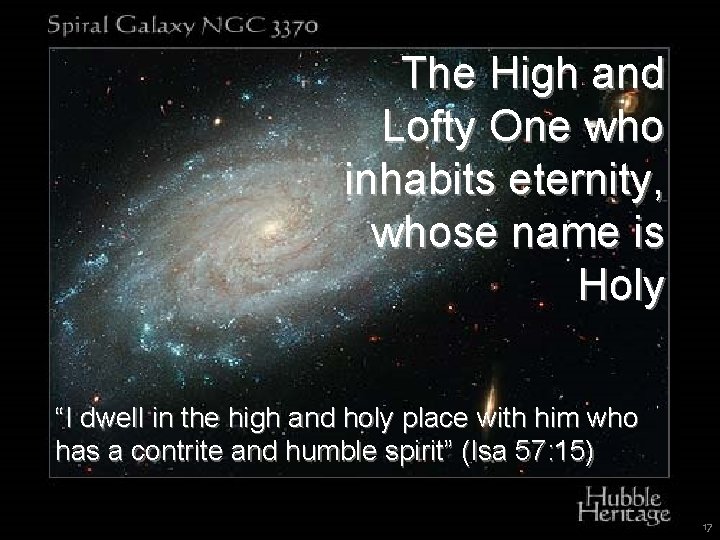


Ho, everyone who thirsts,
come to the waters;
and you that have no money,
come, buy and eat!
Come, buy wine and milk
without money and without price.
Why do you spend your money for that which is not bread,
and your labour for that which does not satisfy?
Listen carefully to me, and eat what is good,
and delight yourselves in rich food.
Incline your ear, and come to me;
listen, so that you may live.
I will make with you an everlasting covenant,
my steadfast, sure love for David.
See, I made him a witness to the peoples,
a leader and commander for the peoples.
See, you shall call nations that you do not know,
and nations that do not know you shall run to you,
because of the Lord your God, the Holy One of Israel,
for he has glorified you.
Seek the Lord while he may be found,
call upon him while he is near;
let the wicked forsake their way,
and the unrighteous their thoughts;
let them return to the Lord, that he may have mercy on them,
and to our God, for he will abundantly pardon.
For my thoughts are not your thoughts,
nor are your ways my ways, says the Lord.
For as the heavens are higher than the earth,
so are my ways higher than your ways
and my thoughts than your thoughts.
For as the rain and the snow come down from heaven,
and do not return there until they have watered the earth,
making it bring forth and sprout,
giving seed to the sower and bread to the eater,
so shall my word be that goes out from my mouth;
it shall not return to me empty,
but it shall accomplish that which I purpose,
and succeed in the thing for which I sent it.
For you shall go out in joy,
and be led back in peace;
the mountains and the hills before you
shall burst into song,
and all the trees of the field shall clap their hands.
Instead of the thorn shall come up the cypress;
instead of the brier shall come up the myrtle;
and it shall be to the Lord for a memorial,
for an everlasting sign that shall not be cut off.
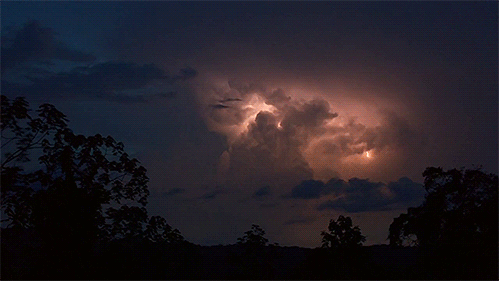

Then Solomon said, ‘The Lord has said that he would reside in thick darkness. I have built you an exalted house, a place for you to reside in for ever.’
Then the king turned round and blessed all the assembly of Israel, while all the assembly of Israel stood. And he said, ‘Blessed be the Lord, the God of Israel, who with his hand has fulfilled what he promised with his mouth to my father David, saying, “Since the day that I brought my people out of the land of Egypt, I have not chosen a city from any of the tribes of Israel in which to build a house, so that my name might be there, and I chose no one as ruler over my people Israel; but I have chosen Jerusalem in order that my name may be there, and I have chosen David to be over my people Israel.” My father David had it in mind to build a house for the name of the Lord, the God of Israel. But the Lord said to my father David, “You did well to consider building a house for my name; nevertheless, you shall not build the house, but your son who shall be born to you shall build the house for my name.” Now the Lord has fulfilled his promise that he made; for I have succeeded my father David, and sit on the throne of Israel, as the Lord promised, and have built the house for the name of the Lord, the God of Israel. There I have set the ark, in which is the covenant of the Lord that he made with the people of Israel.’
Then Solomon stood before the altar of the Lord in the presence of the whole assembly of Israel, and spread out his hands. Solomon had made a bronze platform five cubits long, five cubits wide, and three cubits high, and had set it in the court; and he stood on it. Then he knelt on his knees in the presence of the whole assembly of Israel, and spread out his hands towards heaven. He said, ‘O Lord, God of Israel, there is no God like you, in heaven or on earth, keeping covenant in steadfast love with your servants who walk before you with all their heart— you who have kept for your servant, my father David, what you promised to him. Indeed, you promised with your mouth and this day have fulfilled with your hand. Therefore, O Lord, God of Israel, keep for your servant, my father David, that which you promised him, saying, “There shall never fail you a successor before me to sit on the throne of Israel, if only your children keep to their way, to walk in my law as you have walked before me.”Therefore, O Lord, God of Israel, let your word be confirmed, which you promised to your servant David.
‘But will God indeed reside with mortals on earth? Even heaven and the highest heaven cannot contain you, how much less this house that I have built! Have regard to your servant’s prayer and his plea, O Lord my God, heeding the cry and the prayer that your servant prays to you. May your eyes be open day and night towards this house, the place where you promised to set your name, and may you heed the prayer that your servant prays towards this place. And hear the plea of your servant and of your people Israel, when they pray towards this place; may you hear from heaven your dwelling-place; hear and forgive.
‘If someone sins against another and is required to take an oath and comes and swears before your altar in this house, may you hear from heaven, and act, and judge your servants, repaying the guilty by bringing their conduct on their own head, and vindicating those who are in the right by rewarding them in accordance with their righteousness.
‘When your people Israel, having sinned against you, are defeated before an enemy but turn again to you, confess your name, pray and plead with you in this house, may you hear from heaven, and forgive the sin of your people Israel, and bring them again to the land that you gave to them and to their ancestors.
‘When heaven is shut up and there is no rain because they have sinned against you, and then they pray towards this place, confess your name, and turn from their sin, because you punish them, may you hear in heaven, forgive the sin of your servants, your people Israel, when you teach them the good way in which they should walk; and send down rain upon your land, which you have given to your people as an inheritance.
‘If there is famine in the land, if there is plague, blight, mildew, locust, or caterpillar; if their enemies besiege them in any of the settlements of the lands; whatever suffering, whatever sickness there is; whatever prayer, whatever plea from any individual or from all your people Israel, all knowing their own suffering and their own sorrows so that they stretch out their hands towards this house; may you hear from heaven your dwelling-place, forgive, and render to all whose heart you know, according to all their ways, for only you know the human heart. Thus may they fear you and walk in your ways all the days that they live in the land that you gave to our ancestors.
‘Likewise when foreigners, who are not of your people Israel, come from a distant land because of your great name, and your mighty hand, and your outstretched arm, when they come and pray towards this house, may you hear from heaven your dwelling-place, and do whatever the foreigners ask of you, in order that all the peoples of the earth may know your name and fear you, as do your people Israel, and that they may know that your name has been invoked on this house that I have built.
‘If your people go out to battle against their enemies, by whatever way you shall send them, and they pray to you towards this city that you have chosen and the house that I have built for your name, then hear from heaven their prayer and their plea, and maintain their cause.
‘If they sin against you—for there is no one who does not sin—and you are angry with them and give them to an enemy, so that they are carried away captive to a land far or near; then if they come to their senses in the land to which they have been taken captive, and repent, and plead with you in the land of their captivity, saying, “We have sinned, and have done wrong; we have acted wickedly”; if they repent with all their heart and soul in the land of their captivity, to which they were taken captive, and pray towards their land, which you gave to their ancestors, the city that you have chosen, and the house that I have built for your name,then hear from heaven your dwelling-place their prayer and their pleas, maintain their cause and forgive your people who have sinned against you. Now, O my God, let your eyes be open and your ears attentive to prayer from this place.
‘Now rise up, O Lord God, and go to your resting-place,
you and the ark of your might.
Let your priests, O Lord God, be clothed with salvation,
and let your faithful rejoice in your goodness.
O Lord God, do not reject your anointed one.
Remember your steadfast love for your servant David.’
When Solomon had ended his prayer, fire came down from heaven and consumed the burnt-offering and the sacrifices; and the glory of the Lord filled the temple. The priests could not enter the house of the Lord, because the glory of the Lord filled the Lord’s house. When all the people of Israel saw the fire come down and the glory of the Lord on the temple, they bowed down on the pavement with their faces to the ground, and worshiped and gave thanks to the Lord, saying,
‘For he is good,
for his steadfast love endures for ever.’
Then the king and all the people offered sacrifice before the Lord. King Solomon offered as a sacrifice twenty-two thousand oxen and one hundred and twenty thousand sheep. So the king and all the people dedicated the house of God. The priests stood at their posts; the Levites also, with the instruments for music to the Lord that King David had made for giving thanks to the Lord—for his steadfast love endures for ever—whenever David offered praises by their ministry. Opposite them the priests sounded trumpets; and all Israel stood.
Solomon consecrated the middle of the court that was in front of the house of the Lord; for there he offered the burnt-offerings and the fat of the offerings of well-being because the bronze altar Solomon had made could not hold the burnt-offering and the grain-offering and the fat parts.
At that time Solomon held the festival for seven days, and all Israel with him, a very great congregation, from Lebo-hamath to the Wadi of Egypt. On the eighth day they held a solemn assembly; for they had observed the dedication of the altar for seven days and the festival for seven days. On the twenty-third day of the seventh month he sent the people away to their homes, joyful and in good spirits because of the goodness that the Lord had shown to David and to Solomon and to his people Israel.
Thus Solomon finished the house of the Lord and the king’s house; all that Solomon had planned to do in the house of the Lord and in his own house he successfully accomplished.
Then the Lord appeared to Solomon in the night and said to him: ‘I have heard your prayer, and have chosen this place for myself as a house of sacrifice. When I shut up the heavens so that there is no rain, or command the locust to devour the land, or send pestilence among my people, if my people who are called by my name humble themselves, pray, seek my face, and turn from their wicked ways, then I will hear from heaven, and will forgive their sin and heal their land. Now my eyes will be open and my ears attentive to the prayer that is made in this place. For now I have chosen and consecrated this house so that my name may be there for ever; my eyes and my heart will be there for all time. As for you, if you walk before me, as your father David walked, doing according to all that I have commanded you and keeping my statutes and my ordinances, then I will establish your royal throne, as I made covenant with your father David saying, “You shall never lack a successor to rule over Israel.”
‘But if you turn aside and forsake my statutes and my commandments that I have set before you, and go and serve other gods and worship them, then I will pluck you up from the land that I have given you; and this house, which I have consecrated for my name, I will cast out of my sight, and will make it a proverb and a byword among all peoples. And regarding this house, now exalted, everyone passing by will be astonished, and say, “Why has the Lord done such a thing to this land and to this house?” Then they will say, “Because they abandoned the Lord the God of their ancestors who brought them out of the land of Egypt, and they adopted other gods, and worshiped them and served them; therefore he has brought all this calamity upon them.” ’
Then the LORD appeared to Solomon by night, and said to him:
“I have heard your prayer, and have chosen this place for Myself as a house of sacrifice.
“When I shut up heaven and there is no rain,
or command the locusts to devour the land, or send pestilence among My people,
“if My people who are called by My name will humble themselves,
and pray and seek My face, and turn from their wicked ways,
then I will hear from heaven, and will forgive their sin and heal their land.
“Now My eyes will be open and My ears attentive to prayer made in this place.
“For now I have chosen and sanctified this house,
that My name may be there forever;
and My eyes and My heart will be there perpetually.
“As for you, if you walk before Me as your father David walked,
and do according to all that I have commanded you,
and if you keep My statutes and My judgments,
“then I will establish the throne of your kingdom,
as I covenanted with David your father, saying,
‘You shall not fail to have a man as ruler in Israel.’
“But if you turn away and forsake My statutes and My commandments which I have set before you,
and go and serve other gods, and worship them,
“then I will uproot them from My land which I have given them;
and this house which I have sanctified for My name I will cast
out of My sight, and will make it a proverb and a byword among all peoples.
“And as for this house, which is exalted, everyone who passes by it will be astonished and say,
‘Why has the LORD done thus to this land and this house?’
“Then they will answer, ‘Because they forsook the LORD God of their fathers, who brought them out of the land of Egypt,
and embraced other gods, and worshiped them and served them; therefore He has brought all this calamity on them.’ ”
(1 Kings 9:1-9)
So Ahab sent for all the children of Israel, and gathered the prophets together on Mount Carmel.
And Elijah came to all the people, and said, “How long will you falter between two opinions? If the LORD is God, follow Him; but if Baal, follow him.” But the people answered him not a word.
Then Elijah said to the people, “I alone am left a prophet of the LORD; but Baal’s prophets are four hundred and fifty men. “Therefore let them give us two bulls; and let them choose one bull for themselves, cut it in pieces, and lay it on the wood, but put no fire under it; and I will prepare the other bull, and lay it on the wood, but put no fire under it.
“Then you call on the name of your gods, and I will call on the name of the LORD; and the God who answers by fire, He is God.” So all the people answered and said, “It is well spoken.”
Now Elijah said to the prophets of Baal, “Choose one bull for yourselves and prepare it first, for you are many; and call on the name of your god, but put no fire under it.”
So they took the bull which was given them, and they prepared it, and called on the name of Baal from morning even till noon, saying, “O Baal, hear us!” But there was no voice; no one answered. Then they leaped about the altar which they had made.
And so it was, at noon, that Elijah mocked them and said, “Cry aloud, for he is a god; either he is meditating, or he is busy, or he is on a journey, or perhaps he is sleeping and must be awakened.”
So they cried aloud, and cut themselves, as was their custom, with knives and lances, until the blood gushed out on them.
And when midday was past, they prophesied until the time of the offering of the evening sacrifice. But there was no voice; no one answered, no one paid attention.
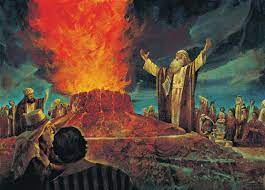 Then Elijah said to all the people, “Come near to me.” So all the people came near to him. And he repaired the altar of the LORD that was broken down.
Then Elijah said to all the people, “Come near to me.” So all the people came near to him. And he repaired the altar of the LORD that was broken down.
And Elijah took twelve stones, according to the number of the tribes of the sons of Jacob, to whom the word of the LORD had come, saying, “Israel shall be your name.”
Then with the stones he built an altar in the name of the LORD; and he made a trench around the altar large enough to hold two seahs of seed. And he put the wood in order, cut the bull in pieces, and laid it on the wood, and said, “Fill four waterpots with water, and pour it on the burnt sacrifice and on the wood.”Then he said, “Do it a second time,” and they did it a second time; and he said, “Do it a third time,” and they did it a third time.
So the water ran all around the altar; and he also filled the trench with water.
And it came to pass, at the time of the offering of the evening sacrifice, that Elijah the prophet came near and said, “LORD God of Abraham, Isaac, and Israel, let it be known this day that You are God in Israel and I am Your servant, and that I have done all these things at Your word.
“Hear me, O LORD, hear me, that this people may know that You are the LORD God, and that You have turned their hearts back to You again.”
Then the fire of the LORD fell and consumed the burnt sacrifice, and the wood and the stones and the dust, and it licked up the water that was in the trench.
Now when all the people saw it, they fell on their faces; and they said, “The LORD, He is God! The LORD, He is God!”
And Elijah said to them, “Seize the prophets of Baal! Do not let one of them escape!” So they seized them; and Elijah brought them down to the Brook Kishon and executed them there.

Then Elijah said to Ahab, “Go up, eat and drink; for there is the sound of abundance of rain.”
So Ahab went up to eat and drink. And Elijah went up to the top of Carmel; then he bowed down on the ground, and put his face between his knees,
and said to his servant, “Go up now, look toward the sea.” So he went up and looked, and said, “There is nothing.” And seven times he said, “Go again.”
Then it came to pass the seventh time,that he said, “There is a cloud, as small as a man’s hand, rising out of the sea!” So he said, “Go up, say to Ahab, ‘Prepare your chariot,and go down before the rain stops you.’ ”
Now it happened in the meantime that the sky became black with clouds and wind, and there was a heavy rain. So Ahab rode away and went to Jezreel... (1 Kings 17-18)

First Kings is the gripping story of how to lose a kingdom. As we read these Old Testament books, the key to making them live and be vital in our lives is to see that they are visual aids by which God is showing us what is going on in our own lives. We can see ourselves in every one of these Old Testament stories and when we do, the words take on eyes and look at us. We discover that the words are aimed exactly and directly at us. The view that the Bible gives of man is that every one of us is intended to be a king over a kingdom. The whole purpose of the Lord Jesus coming into our lives, which is the theme of the book of Romans, is that we might learn how to reign over the kingdom of our lives in God -- given authority and victory. It is this that makes human life full and complete and fascinating when we learn to walk in God's power. One of the overworked phrases constantly bandied about in Christian circles is "the victorious Christian life." Unfortunately that has been abused, distorted, twisted, and perverted so many times that it has lost much of its meaning for us. But if you take it in the freshness of its original intention, that is exactly what God has in mind for you -- to learn how to walk in victory as a king over the kingdom of your life and thus find its intended fulfillment. That is exactly what these books of the Old Testament illustrate for us, especially the books dealing with the monarchy in Israel.
God called aside the nation Israel; he marked it out as his own people. He made, in a sense, a stage of the little land of Israel. He bid the whole world to look upon that nation. What went on in that land is a portrayal of what is going on throughout the whole course of human history, and individually going on in each of our lives. If we see these books like this, they take on a tremendously intense meaning and purpose in our lives.
The book of 1 Kings holds the secret of success in reigning over the kingdom of your life. It is the secret of learning to be submissive to the authority and dominion of God in your own life. In other words, man can never exercise dominion over his life unless he first subjects himself to the dominion of God. If you yield to God's dominion, you are given reign over the areas in your own life. On the other hand, if you refuse the dominion of God in your own life, you cannot under any circumstances or by any means fulfill your desire to be in authority over your life. It is impossible! This is what these books teach us. That is why all through this book you will find that the spotlight is on the throne. It is the king that is the important one -- for as the king goes, so goes the nation. In your life your will is king. What your will allows to enter in to control your life, determines how the kingdom of your life goes. King Solomon, the successor to David, is upon the throne. David is still king when the book opens, but immediately he is confronted by the rebellion of another one of his sons, Adonijah. Adonijah attempts to gain control of the throne even before his father David dies. David, learning of this, acts to put Solomon on the throne. Solomon is anointed king while his father still lives and in effect assumes the throne while David is still alive. This indicates the first mark of what a real reigning authority in our lives should be. Authority must come by the gift and hand of God. We cannot reign except as we are established by God. When we give ourselves to the authority of God, it becomes his responsibility to bring every circumstance and every enemy and every rebellion that would otherwise threaten our reign, under control. This is what he did in the case of Adonijah.
As we read on in the second and third chapters you see Solomon coming to the throne. He rules in power and might and glory. Solomon's reign marks the greatest extension of the kingdom of Israel and was particularly characterized by a display of outward majesty and power. But in chapter three, you also have the seeds of defeat. These are very, very important to notice. In verses one and two we read:
Solomon made a marriage alliance with Pharaoh king of Egypt; he took Pharaoh's daughter, and brought her into the city of David, until he had finished building his own house and the house of the Lord and the wall around Jerusalem. The people were sacrificing at the high places, however, because no house had yet been build for the name of the Lord. (1 Kings 3:1-2 RSV)
Then the all-important third verse:
Solomon loved the Lord, walking in the statutes of David his father; only, he sacrificed and burnt incense at the high places. (1 Kings 3:3 RSV)
Now here is a man who loves God. He loves him with all his heart. Solomon begins his reign with a wonderful expression of yieldedness and a desire for God's rule and authority in his life. He follows in the footsteps of his father, David. Nevertheless, he does two little things -- which seem to be very small, trivial matters -- that ultimately overthrow his kingdom. He makes an alliance with the daughter of Pharaoh, the King of Egypt, (which always pictures the world) and brings her into the central life of the nation of Israel. Here an alliance is made with the world. Then he also worships at the high places. In the pagan religions of that day all the worship and rites were conducted up on the mountain tops. The pagan tribes had erected altars, many of which were the center of very idolatrous and licentious worship. Frequently, the altar was the place where the fertility of sex gods was worshiped in a sexual display. But the altars were also taken over by the people of Israel and used for the sacrifices to Jehovah. The ark of God was now in the city of Jerusalem in the tabernacle, where David placed it. But Solomon did not present his offerings at the altar in the tabernacle; instead he was offering in these high places. He was offering sacrifices to God, but on pagan altars. Outwardly there was much that was beautiful and admirable in this young man's rule, and in general his heart was set in the right direction. Nevertheless, there was an area that was not fully committed to God. There was a weakness in his fellowship. There was a lack of understanding that the secret of God's love lay in that inner yieldedness to his will, represented by a worship before the ark of the covenant. In many, many a life, here is often much outward yieldedness and commitment to the will of God, but in the private inner life there is a lack of warmth and a hunger after God. It was here that the strength of David so vividly lay. Even though David fell into the black sins of murder and adultery, nevertheless, in the inner sanctum of his heart there was a deep and abiding commitment to the will of God and a hungering after the person of God. You see it breaking through in all the psalms of David. But this is lacking in Solomon, and this is the first indication that something is wrong in his life.
This story takes us into a description of the beauty and the display of the greatness of Solomon's kingdom. The second mark of a God-given power and reign is given to us in chapter three in the account of Solomon's dream, in which God appeared and told him to ask for whatever he wanted. Solomon, in a marvelous passage, asks not for riches or for honor, but for wisdom:
"Give thy servant therefore an understanding mind to govern thy people, that I may discern between good and evil; for who is able to govern this thy great people?" (1 Kings 3:9 RSV)
In beginning his reign like this, Solomon indicated that he had grasped to a great extent what was a primary need in exercising authority within the kingdom that God had given him -- wisdom. When you come to the New Testament, you find that this is true. In the book of Hebrews the writer takes the people that he is writing to — to task because he says, "When you ought to be teachers, when you have been Christians long enough that by now you ought to be able to teach others, you have need of somebody to take you back to kindergarten and instruct you all over again in the ABC's of the Christian life." (Hebrews 5:12) He says the sign of those who are mature in Christ and have learned to really walk in Him, is that they are able to discern between good and evil. That is the problem today, isn't it? Good looks bad, and bad looks good. Anybody can tell good from evil when good looks good and evil looks evil. The great problem is to identify evil when it comes smiling at you, dripping with solicitude, and seems to offer you everything you have been looking for. Christian maturity comes when we learn to exercise the spirit of wisdom to distinguish between good and evil. That which seems to minister to the spirit may actually be a clever trap of Satan to plant a seed of distrust in the heart and will eventually produce terrible fruit a few years later in life.
This wisdom is what Solomon asked for. God granted him his request. But there was one slight weakness in his request. He asked for wisdom that he might govern the people. We can only wish as we read, that this fine young man had asked for wisdom to govern his own life first. That is where he began to fail. It is evident from this that God knows exactly what is in a person. He granted Solomon this wisdom but he also gave with it the circumstances that put wisdom to the test. God does this with all of us. God knows exactly what is in us. He gives us essentially what is our basic, urgent, clamant cry to him. If we want something from God badly enough, he will give it to us. But he also puts us in circumstances that will bring out what is in us. Along with the wisdom, he gave to Solomon riches and honor. It was the riches and honor that overthrew Solomon. As Solomon gloried and exulted in the magnificence of his kingdom, pride began to enter his heart. His downfall came as a result of this. The first mark of rulership then, in order to establish your rule in the kingdom of your own life, is dependence upon God. The second is wisdom -- insight and understanding of yourself -- if you are to walk in the Spirit. We have this demonstrated to us in Solomon's wise judgment between the two mothers who brought a baby to him. They had both had a baby, but one baby had died. Both women claimed the living baby. Solomon was asked to decide whose baby it was. In a display of his wisdom to analyze other people's problems he said, "Bring a sword." Then laying the baby down before these two women, he said, "Now divide the baby in half. Give one half to one woman and the other half to the other." The real mother immediately said, "Oh, no; don't do that! Let the other woman have the baby." But the other woman said, "No, that is fine. That is perfectly fair. Divide the child and we will each take half." Solomon knew at once who the real mother was. Thus his wisdom was demonstrated. Chapter four, verse 29, begins a commentary on how much wisdom Solomon was given:
God gave Solomon wisdom and understanding beyond measure, and largeness of mind like the sand of the seashore, so though Solomon's wisdom surpassed the wisdom of all the people of the east [including all the so-called wisdom of the orient -- the Chinese and Indian] and all the wisdom of Egypt. For he was wiser than all other men, wiser than Ethan the Ezrahite, and Herman, Calcol, and Darda, the sons of Mahol [these were the newspaper commentators of that day!]; and his fame was in all the nations round about. He also uttered three thousand proverbs [we have them recorded in the book of Proverbs]; and his songs were a thousand and five [of those we have only one: "The Song of Solomon" or "The Song of Songs"]. He spoke of trees, from the cedar that is in Lebanon to the hyssop that grows out of the wall; he spoke also of beasts, and of birds, and of reptiles, and of fish. And men came from all peoples to hear the wisdom of Solomon, and from all the kings of the earth, who had heard of his wisdom. (1 Kings 4:29-34 RSV)
What a picture this is of what Paul says in 1 Corinthians, "We have the mind of Christ," and "the spiritual man judges all things." (1 Corinthians 2:15,16) He does not need anyone to teach him, since he already discerns all things. He is able to analyze and understand all things.
In chapter four you have the third mark of what it means to reign -- orderliness. A kingdom is orderly. God is not the author of confusion for he does things decently and in order. Also in chapter four, verse 20, is the fourth mark of authority:
Judah and Israel were as many as the sand by the sea; they ate and drank and were happy. Solomon ruled over all the kingdoms from the Euphrates to the land of the Philistines and to the border of Egypt; they brought tribute and served Solomon all the days of his life. (1 Kings 4:20 RSV)
That is total control over all that God intended him to have. Have you learned to reign like that in your life? This is what God wants you to have.
In chapters five through eight we find the account of the glorious temple that Solomon built. How marvelous was this beautiful building. The interior was even more glorious than the outside. The inside was entirely covered with gold. To have entered that sanctuary must have been a most amazing experience. Everything one touched was covered with gold. But the central glory of it was the Shekinah glory of God which came down and dwelt in the holy place when Solomon dedicated the temple. In a marvelous prayer, Solomon gives thanks to the grace of God and recognizes again the one great principle by which a kingdom must be maintained -- the king's obedience to the throne of God.
Then we have the story, wonderful in its detail, of the visits of the Queen of Sheba and the King of Tyre to Solomon, and the recognition by the nations of the glory of Solomon's kingdom. Then suddenly, at the beginning of chapter 11, the whole story takes a quick turn in the other direction. We read of the results of the seeds of evil that were sown earlier in Solomon's life:
Now King Solomon loved many foreign women: the daughter of Pharaoh, and Moabite, Ammonite, Edomite, Sidonian, and Hittite women, (1 Kings 11:1 RSV)
These are pagan tribes.
...from the nations concerning which the Lord had said to the people of Israel, "You shall not enter into marriage with them, neither shall they with you, for surely they will turn away your heart after their gods;" Solomon clung to these in love. He had seven hundred wives, princesses, and three hundred concubines; and [in the greatest understatement in the Bible] his wives turned away his heart. (1 Kings 11:3 RSV)
This is the same man who in the book of Proverbs wrote "He who finds a wife finds a good thing." (Proverbs 19:22) This is the greatest example I know of, of a good thing carried to an extreme. One thousand wives! Somebody has said that he was amply punished by having one thousand mothers-in-law! But this also marks the weakness and the failure of Solomon as his heart was turned away from God. Now notice where it first began. This man enjoyed all the magnificence of his rule, with the greatest glory of the kingdom committed to him. The outward magnificence here was evidence of God's blessing upon his life. But his downfall began when his heart became captured by something that God had prohibited. This is exactly in line with the warning that Jesus gives in the Sermon on the Mount when he says "Watch out where your heart goes, for where your treasure is, there will your heart be also." (Luke 12:34) The first step in moral decline always begins with your emotions. What do you allow your emotions to center upon? What captures the central place of emotion in your life? That is where the decline begins. Then we read it is followed by idolatry:
For Solomon went after Ashtoreth [the sex goddess] the goddess of the Sidonians, and after Milcom the abomination of the Ammonites. So Solomon did what was evil in the sight of the Lord, and did not wholly follow the Lord, as David his father had done. Then Solomon built a high place for Chemosh the abomination of Moab," (1 Kings 11:5-7a RSV)
Chemosh was the hideous image in which a fire was built and at the height of the religious festival children were thrown into the fire. It was Solomon who built this place where the rites centered on the worship of this grinning god.
...and for Molech the abomination of the Ammonites [another fertility god], on the mountain east of Jerusalem. And so he did for all his foreign wives, who burned incense and sacrificed to their gods. And the Lord was angry with Solomon, because his heart had turned away... (1 Kings 11:7b-9a RSV)
Three times in rapid succession in the rest of this chapter "the Lord raised up an adversary against Solomon." First Hadad, the Edomite the man of the flesh. Then in verse 23:
God also raised up an adversary to him, Rezon, the son of Eliada, who had fled from his master Hadadezer king of Zobah. (1 Kings 11:23 RSV)
Then in verse 26:
Jeroboam the son of Nebat, an Ephraimite of Zeredah, (1 Kings 11:26 RSV) [who later split the kingdom].
So these adversaries came in to overthrow Solomon and to accomplish his defeat. The chapter closes with Solomon "sleeping with his fathers" and being buried in the city of David -- a sudden collapse to the glory and majesty of his kingdom.
I heard recently of a man who had exercised great pulpit power and a tremendous ministry in many ways for God and whose whole ministry suddenly collapsed. He was brought before his session on moral charges. It was discovered that there had been an unjudged affection in his heart that had been going on behind the scenes, year after year. Despite the outward display of power and authority that he exercised in his ministry, there was eating away at his heart and emotions that seed which was to utterly overthrow his kingdom. This story is repeated again and again in lives everywhere.
Chapter 12 begins the second movement in this book -- the degradation and breakup of the kingdom. Jeroboam split the kingdom, taking the ten tribes of Israel in the north to begin the Northern Kingdom. He reintroduced in Israel the awful worship of golden calves. Long before, while Moses was up on the mountain communing with God, the people came to Aaron and said, "We want to have a God that we can worship like the nations." Do you remember what Aaron told Moses after he got down off the mountain? He said, "I told them to bring all their gold all their earrings and all their jewelry and I took all this gold and threw it into the fire. Lo and behold, a calf came walking out. We fell down and worshiped it, calling it Jehovah." (Exodus. 32:23, 24) It was not that they intended to be idolatrous. They simply wanted some visible evidence on which to center their worship. Now we come to the sin of Jeroboam. He is forever afterwards known in Israel as "Jeroboam the son of Nebat who caused Israel to sin." Here it is not one calf, but two calves. It is the same sin multiplied, doubled in its intensity and power that is introduced into the life of the nation by Jeroboam.
Chapter 14 presents to us the story of the invasion and defeat of Israel by Egypt, the very Egypt out of which God had led this people. Egypt is again a picture of the world and its ways -- its wickedness its folly, its futility, and its foolishness. We read in chapter 14 verses 25 and 26:
In the fifth year of King Rehoboam, Shishak king of Egypt came up against Jerusalem; he took away the treasures of the house of the Lord... (1 Kings 14:25-26a RSV)
He assaulted the place of worship first of all.
...and the treasures of the king's house; he took away everything. He also took away all the shields of gold which Solomon had made. (1 Kings 14: 26b RSV)
Do you get the picture? Solomon who knew God and sought to walk with him did not fully judge the emotions and attachments of his heart. He was finally undermined and went back into the ways of the world with all its foolish manifestation, and so lost that inner glory and sense of worship where God was exalted in the inner temple of his own life. After this the account tells of the various kings that come to the throne of Israel. Nadab is followed by Baasha and Zimri. Finally comes Ahab and his wicked wife Jezebel.
The final part of the book, beginning in chapter 17, introduces the prophetic ministry beginning with Elijah. There are other prophets who came before Elijah but they did not do miracles. Elijah begins the ministry of miracles in the Bible. The prophets who ministered to Judah, the Southern Kingdom, did no miracles because there God's testimony was still the central life of the nation. But in Israel, the Northern Kingdom, God's presence was rejected and in his place the golden calves were worshiped. The ministry of miracles here is a testimony to the people that God is still in their midst. God sought to shake them up to be aware of the fact that they have drifted away from him. Elijah's ministry is a tremendous revelation of God's dealings with the wayward human heart. First of all, in his ministry, he shut the heavens so that it did not rain upon the land for three years. Then he called down fire from heaven upon the sheriffs and others who were sent to arrest him and bring him before the king. As these miracles caught the attention of the people. there came a degree of repentance. They understood that God was using a harsh hand, as God sometimes has to do with us. in chastisement and judgment to wake us up and make us aware of how we are drifting away from central worship of him in the innermost part of our being.
When this happened there came at last the judgment of Baal, when the two philosophies in Israel came to a headlong clash up on Mt. Carmel. God vindicated his honor by sending fire from heaven to destroy all of Elijah's offering, including all the water that was poured upon the offering and the stone altar, and God reigned in mighty power. When that judgment was exercised, the heavens were opened again and rain poured down upon the land. That is all a picture of us, of what happens in our lives when we resist the right of God to rule in our hearts. God brings us under chastening, and, at last, our stubbornness is broken. The willful rebellion is ended and we are humbled at last before God. Then the rain of grace begins again and pours down upon our hearts to bring fruit and blessing once more.
Following this is the unusual account of Elijah's fear of Jezebel. I am always amused by this. Here is this fearless prophet, this rugged man of God who has faced four hundred priests alone on top of the mountain, now running in terror from one angry woman. He cries as he hides under the juniper bush, "Lord, I have had enough. It was bad enough facing four hundred priests of Baal but when this one woman gets after me, that is too much." She was threatening his life. This is amusing because he says, "Lord, I have had enough -- take my life," but of course he doesn't really mean that. All he would have to do is walk out and find Jezebel and she would accommodate him in his wish. Instead he hides under the juniper bush. God deals with him in wondrous grace. The first thing that he does is to put him to bed and give him a good night's rest. Then God gives him a good square meal. Finally God teaches him the greatest secret that Elijah ever learned -- that God does not always move through earthquake, fire, and thunder -- but many times through the still, small voice of a changed conscience.
The book closes with the story of King Ahab, and his failure, his folly, and his self-centered desire for the vineyard of Naboth, bringing down the judgment of God. In chapter 22 we learn how God works through what seem to be accidental circumstances. The two kings of Israel and Judah go out to battle. Ahab, king of Israel, in his Satanic cleverness tries to put the king of Judah out in the forefront of battle. Ahab dresses the king of Judah in his own armor in order that he might be mistaken for the king of Israel and shot at. But as King Ahab is complimenting himself on how he has tricked the king of Judah into being exposed to danger, we read that an arrow shot into the air (just by chance) by a warrior on the opposite side, finds its way to him and pierces through a crack in the armor into his heart. God's judgment is accomplished! God is the God of circumstances. God is the God of accidents. God is behind all the movements of our lives. This is the revelation of this account.
As I close this book of 1 Kings, the verse that comes most prominently to my mind and thrusts itself upon my heart, is this:
Keep your heart with all vigilance; for from it flow the springs of life. (Proverbs. 4:23)
Outward circumstances will never dethrone you from reigning in your life. Nothing you run up against in terms of outward pressures and outward circumstances will ever succeed in dethroning you. Your dethronement, your moving back into the slavery and bondage of the flesh and the devil, will come only as you permit some rival worship to enter into your heart and dethrone God. When your emotions become attached to some place that is a rival to the worship of God, then the kingdom's days are numbered.
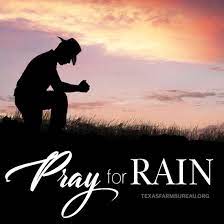
Jesus our Trailblazer
Calamity Howler
The Management of the Universe
Who’ll Stop the Rain? Creedance Clearwater Revival
Song: My Lord Knows the Way Through the Wilderness
